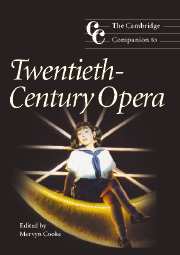2 - Wagner and beyond
from Part one - Legacies
Published online by Cambridge University Press: 28 September 2011
Summary
Wagner was not the only one to change the course of opera's history in the nineteenth century and into the twentieth. And indeed only his most fanatic admirers have ever thought otherwise. It is hard nonetheless not to think of him as someone who left an indelible stamp on twentieth-century opera. Every figure of importance is said to have reacted to him positively or negatively, and rarely indifferently. The possibility exists that this is just another part of the Wagnerian myth that has spread itself like a vulture over Western music since the end of high romanticism, in spite of formidable opposition. The great conductor Hans von Bülow insisted with his usual caustic wit that Richard Strauss should be called Richard III in the dynasty of German music as a Richard II after Wagner was inconceivable (Kennedy 1995, 9). W. H. Auden ventured to suggest that Wagner had no real successors at all, calling him ‘a giant without issue’ (cited in V. Stravinsky and Craft 1978, 400). Not everyone needed to take an interest in him after all, while some of those who did paid him the briefest of respects and quickly went their own way. Igor Stravinsky tells a nice story of how he was persuaded by Diaghilev to go with him at short notice to Bayreuth in 1912 to see Parsifal, even though it meant interrupting work on Le Sacre du printemps (Stravinsky 1936, 67–8). With dismay he noted the mausoleum-like interior of the festival theatre, deplored the cult-like performance, lambasted the Wagner faithful for putting up with it – and simply fled. He did admire ‘the web-like blending of the orchestra from under the stage’, which meant that Parsifal might have been a headache, but at least ‘a headache with aspirin’ (Stravinsky and Craft 1966, 189).
- Type
- Chapter
- Information
- The Cambridge Companion to Twentieth-Century Opera , pp. 14 - 25Publisher: Cambridge University PressPrint publication year: 2005



